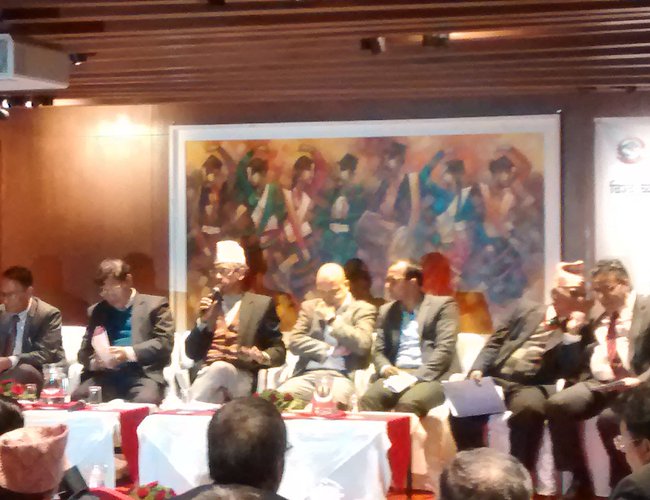
Chaired by Secretary of Commerce Chandra Kumar Ghimire, three hours long interactions organized by Ministry of Commerce urged the government to play a constructive role protecting Nepal’s interest.
At a time when Nepal’s trade deficit is skyrocketing reaching over 700 billion dollars of import against the export of 34 billion, any international trade negotiations have serious important for the country.
As a Least Developed Country planning to qualify for developing or middle-income country by 2022, coming WTO’s ministerial conference is very important and significant.
Dr. Posh Raj Pandey, a senior economist and specialist on trade issues, has said that the acceleration of remaining negotiations under the Doha Development Round should be given due priority during the ministerial conference.
“The WTO Meeting in Doha, Qatar, in 2001 had introduced a raft of issues for negotiations but a very few of the negotiations have been concluded so far and the ministerial meeting — highest decision-making body of the multilateral trade regime — has been stuck with the negotiations in the following meetings and has delivered only a few till date,” said Dr. Pandey.
“During the negotiations, Nepal should be defensive on policy space for industrial and agricultural development, implantation capacity of the country on issues that are brought for negotiations and also look at its aspirations to graduate to the league of developing countries by 2022,” said Pandey.
“The aforementioned issues could adversely affect Nepal as it desires to revert from the deindustrialization era. On the other hand, the facilities promised by the developed countries to least developed countries will be cut after a certain number of years after the country graduates to the league of developing nations.”
Although Nepal is among the few countries to join WTO regime, Nepal’s trade deficit started soaring following it. With political instability and change of course, the last decade remains decades of the downfall of Nepalese industries.
By opening the new political front, Nepal opens the floodgate for right seeking trade unions forcing to shut down many industries. Similarly, opening the markets under WTO regime, Nepalese industries are unable to compete. Given the situation, Nepal’s trade situation stands on the verge of collapse now.
As Nepal’s state of trade is deteriorating, experts have advised the Ministry of Commerce (MoC) to play a constructive role to expedite the remaining negotiations under the Doha Development Round and cautiously look into the new issues going to be taken up at the 11th Ministerial Conference of the World Trade Organization (WTO) scheduled to be held in Buenos Aires of Argentina on December 10-13.
Economist Pushkar Bajracharya has said that the inconclusive negotiations of Doha Round have held back the multilateral trading regime from providing favorable treatment to the least developed countries (LDCs) and the developed economies have reaped the advantage of this.
“Though the developed countries have promised ‘duty-free, quota-free’ market access, LDCs have hardly made use of this facility because the products of LDCs are not able to access the market of the developed countries due to the non-tariff measures that are set to protect their domestic industries,” said Bajracharya.
Citing an inconclusive negotiation under Doha Round on agriculture and fisheries, among others, economist Bajracharya said that the LDCs should stand for improved market access in developed countries for a certain number of years so that they can develop sustainable production base and sustain economic growth.
As Nepalese industrialists have lost fair competitive advantages, the voice of protectionism is growing in the country. Industrialists are demanding to protect the domestic industrial production.
Senior Vice-president of the Federation of Nepalese Chambers of Commerce and Industry (FNCCI), Shekhar Golchha, said that Nepali industries surviving in the duty protection regime have been hit hard along with our promise to bring down the tariff rate gradually along with preference erosion, digital divide, domestic hassles like power cuts, labor unrest, political instability and policy unpredictability in the following years since Nepal’s accession in WTO.
“As a result, we are termed ‘import-driven’ economy and are losing our domestic production base,” said Golchha. “The way Nepal is moving ahead is not sustainable, adding that the country must create an enabling environment for industrialization to develop a robust production base in the country.”
As WTO is a global negotiations forum, a particular country can rarely make any differences or places its agenda. The agenda of particular countries need to go through the group.
After chairing the meeting, Commerce Secretary Chandra Kumar Ghimire assured the stakeholders to raise the issue of Nepal’s own interest through appropriate groups.
“During the ministerial meeting in Buenos Aires, a few new topics will be under discussion for negotiations. They are related with regulating electronic commerce popularly known as e-commerce, integrating micro small medium enterprise into the global trade (the element and ways will be finalized during the negotiations), implementation of trade in services and investment promotion,” said secretary Ghimire.
Whether one likes it or not, WTO is a reality now and Nepal cannot escape. As this is a floor for negotiations, every country in the region wants the protection of their own interests and upper-hand in the trade. Given the commitments and preparation made by the Ministry, there is the reason to optimistic in coming negotiations.
- TANAHU HYDROPOWER PROEJCT: A Significant Achievement
- Apr 15, 2024
- AMBASSADOR HANAN GODAR: Sharing Pain With A Nepali Family
- Mar 30, 2024
- VISIT OF KfW AND EIB TO NEPAL : Mission Matters
- Mar 25, 2024
- NEPAL BRITAIN SOCIETY: Pratima Pande's Leadership
- Mar 24, 2024
- NEPAL ARMY DAY: Time To Recall Glory
- Mar 15, 2024
















